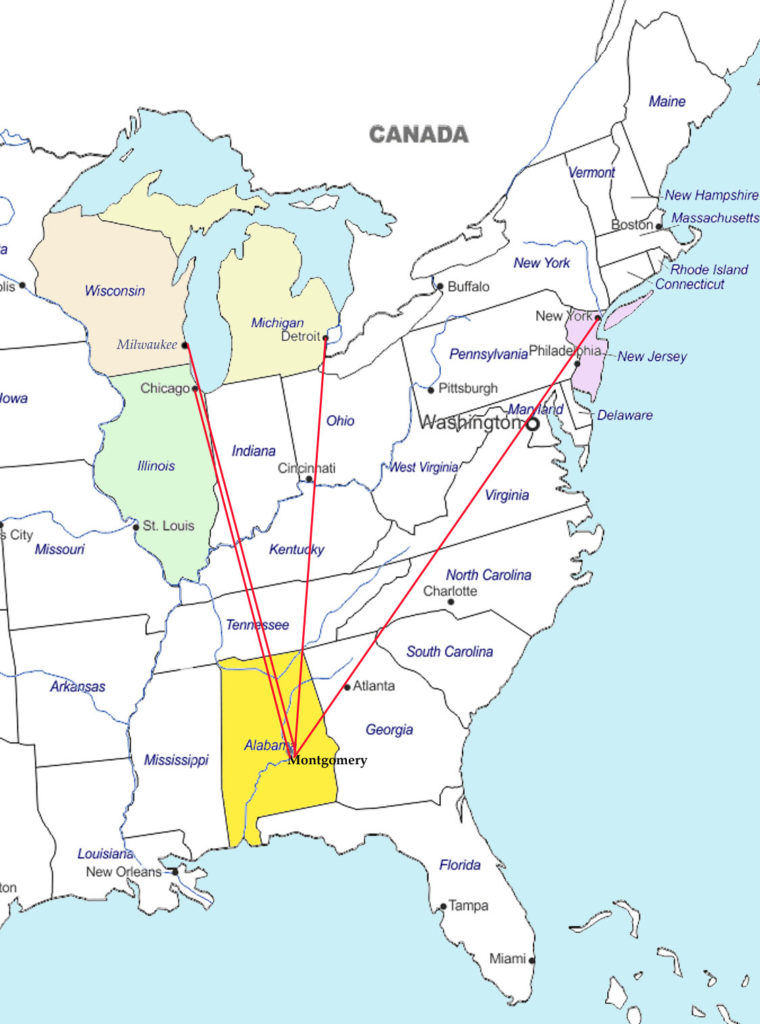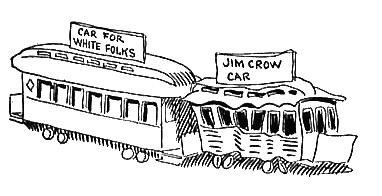
In 1918 and 1919 thirty-seven young women, friends and neighbors of my grandmother Fannie Mae Turner were members of the Edelweiss Club in Montgomery, Alabama. These are snapshots from their lives, place and times.
The Great Migration
In 1916 the word was everywhere – move north, you have a better chance. Friends and neighbors who had made the journey sent back word. The Chicago Defender sent newspapers all over the country with articles about lynchings and poetry. There were articles about a better life in the north. Jobs that paid a living wage. About being able to vote. Pullman porters distributed the Defender throughout the south, even though the white authorities tried to prevent it.
About half of the Edelweiss woman left Montgomery for parts North. They were part of the Great Migration of over six million black people who left the South between 1916 and 1970. My grandparents and most of their friends and family left Montgomery during the early part of the migration.
Fifteen stayed in Montgomery. Three stayed in the south, but moved north to Birmingham, Alabama. One moved to Nashville, Tennessee.
Almost always they traveled on segregated trains in Jim Crow cars until the train crossed into the North.
Ten went to Detroit, including my grandmother and her sister Daisy. One went to Chicago, one to New Jersey and one to Springfield, Ohio. Sometimes siblings went together. Sometimes one went first and others followed. Women married and left with their husbands. They roomed with those who had gone before them and made a place for those that followed. New churches were started by members who found themselves in a city without a church like the one they left behind.
Find more information about the Great Migration in these blog posts:
Eliza’s Children Move North
Letters from home – Montgomery to Detroit 1918
Founding a New Congregational Church
Those Left Behind
Going Down South 1931 – My father describes his trip South.


This opportunity of migration in the 20th century changed many lives for the better. What courageous people they were to leave behind everything they knew to start over in a strange place. And then they formed wonderful supportive communities for each other. It’s indeed a great American story!
It’s sad that they they felt they needed to leave to escape the violence and inequality and segregation. They may well have remained at home if not for that.
I think it’s a damn shame they had to uproot their lives and families.
Some people will always move, but not so many. Same with the people leaving their homes today around the world and heading north, fleeing violence and starvation work.
What an amazing poem, which captures it all. I did not know the Pullman porters distributed the Defender in the south –so courageous. Did the Great Migration end the Edelweiss gatherings?
Probably contributed as people began to marry and move north. Those who remained had other clubs that took up where Edelweiss left off. And wherever they moved. Cards will be played. Delicious repasts will be served.
Yes, they could pick up a bunch in Chicago and they wouldn’t pass them out on the train, but drop them off at designated places.
I love the way you tell this one, and the graphics are good, too. Do you know whether the ten friends who moved to Detroit continued to meet (though not as the Edelweiss club) or at least kept in touch? Or whether the Edelweiss club members who stayed behind continued to meet?
What an upheaval. What a mass shift. But necessary and productive. Still, people must have missed the friends they had to leave behind.
I know that some of them did because of photos and newspaper articles. The cousin who published The Emancipator moved to Detroit too and published a newspaper there too, The Detroit Tribune, so there were articles in there about new clubs, etc.
Racial discrimination is so sad.
Sad and frightening.
The thought of having to tear your lives and those of your family apart, just to try to get a slightly better life is so tragic. It hasn’t gotten all that much better. How do we create a more just world?
At this point, I’m feeling rather hopeless about that.
I study the Great Migration a little when I was researching my stories set in 1920s Chicago. But I didn’t have any idea it lasted until the 1970s.
So, the Edelweiss group was dismembered by the Migration?
I think it was partly that.